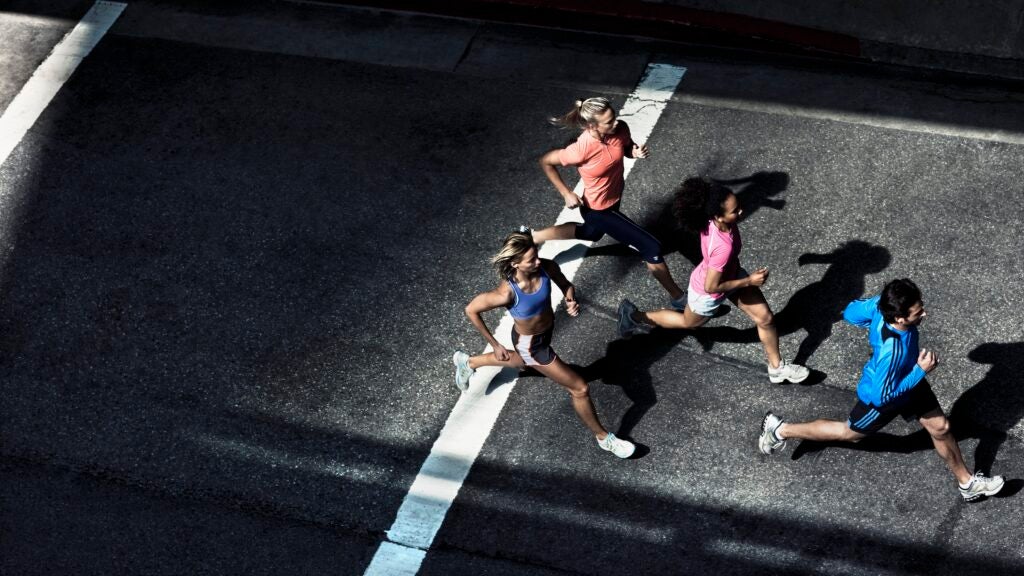
Earlier this summer season, the Working Business Range Coalition (RIDC) launched its #FreedomToRun marketing campaign for Juneteenth, June 19, by releasing a collection of three research on racial illustration in trade employment and operating participation. These research had been produced in partnership with Bentley College, offering in-depth analyses and first-of-its-kind analysis to determine a baseline measure for progress towards racial justice.
The three research had been titled “The Way forward for Working: Connecting with the Subsequent Era of Racially Numerous Runners,” “Racial Range and the Enterprise of Working: Mapping a Path to Equitable Employment, Management, and Possession,” and “Racial Range in Path Working: Understanding the Underrepresented Expertise.” The research had been funded by Altra, Brooks, New Stability, On, Patagonia, Salomon, Saucony, Smartwool, and Strava.
Whereas RIDC previewed these findings earlier this 12 months with trade companions in race administration, occasions, retail, and types, in keeping with RIDC government director Kiera Smalls, it has additionally made a concerted effort to share with key manufacturers and organizations not partnered with the coalition, in an effort to get them to evaluate their inner insurance policies and practices.
What Is the RIDC?
RIDC is a 501(c)3 nonprofit that was established in October 2020, on the top of the COVID-19 pandemic and within the wake of the tragic deaths of Ahmaud Arbery, George Floyd, and Breonna Taylor, which sparked a social justice reckoning throughout practically each trade, together with the operating house. The group was based by a small group of operating trade leaders that got here collectively to kind the RIDC, together with co-chairs Chris Lampen-Crowell and Alison Mariella Désir, with the purpose of accelerating employment alternatives and operating participation amongst Black, Indigenous, and Folks of Shade (BIPOC) within the U.S. by establishing transparency and measuring accountability amongst organizations.
That’s the place this analysis got here in, says Erin Flynn, a professor of selling at Bentley College and a lead researcher on the research who has additionally been concerned with RIDC since its inception. In 2020, Flynn requested Lampen-Crowell if his group had knowledge on the place the trade presently stood, understanding she’d be stunned if anybody had really ever studied this. When he mentioned they didn’t, she volunteered to assist with the analysis, which might be vital for pursuing the group’s mission.
“With out that, you’re holding subjective conversations,” Flynn says. “Individuals are well-intentioned. They may assume they’re making progress and speaking about it extra, however with out the information, we are able to’t actually know if we’re really making true change.”
In accordance with knowledge from the Sports activities and Health Business Affiliation (SFIA), roughly 34 % of runners (16 million folks) within the U.S. are folks of coloration, which highlights why it’s crucial for key gamers within the trade to deal with points associated to systemic racism and a scarcity of inclusivity, particularly because the U.S. inhabitants is rising more and more extra racially numerous, with folks of coloration projected to be the bulk by 2045.
Giant operating occasions particularly, together with all three U.S.-based World Marathon Majors, are nonetheless lagging in terms of monitoring racial demographic data amongst its individuals, which has undoubtedly contributed to setbacks in progress, Smalls says.
“Gender knowledge has develop into commonplace apply, and it’s mandatory to acknowledge that race and ethnicity are important for range, fairness, and inclusion progress, too,” she says. “We’d like occasion organizers to higher perceive the make-up of their participant base and establish current disparities and underrepresentation. By persistently advocating for accumulating and using this data, we are able to construct larger consciousness, accountability, and progress towards reaching extra inclusive and equitable race occasions.”
It’s particularly noteworthy that this analysis was launched now, as extra companies and people alike have grown hesitant to debate points associated to DEI after the anti-racism conversations surrounding the 2020 actions inevitably died down.
“You will need to acknowledge that the dialog surrounding racism within the operating trade has confronted some setbacks as time has progressed since 2020,” Smalls says. “Many corporations have develop into extra hesitant to publicly tackle these points, contributing to a scarcity of progress in addressing the systemic challenges confronted by runners of coloration.”
Range in Business Management Stays Low
By way of range in operating trade employment, the research confirmed that 11 % of workers are Black/African American, with just one % holding senior administration management positions. With regard to range, fairness, and inclusion initiatives, solely 15 % are led by Black/African American senior executives, whereas 80 % of senior executives main them are white.
“The quick reply for why [top leadership remains heavily white] is systemic racism. Once we speak about illustration inside organizations, this is without doubt one of the key areas that want to vary,” Flynn explains. “The will for expedience in hiring and the prioritization of cultural match are quite common mindsets within the hiring course of throughout the trade. Once we’re in a predominantly white trade the place hiring managers are predominantly white, if we’re sourcing candidates by way of private {and professional} networks, we’re virtually guaranteeing that jobs are going to go to white candidates, which is a fundamental motive why we’re seeing disparate percentages of racial illustration.”
Moreover, the research confirmed that 70 % of operating organizations have DEI objectives, although 59 % presently don’t monitor progress.
“Reaching racial justice is a societal crucial, and operating—as an trade and sport—have to be a part of that transformation,” Smalls mentioned. “From the dearth of racial range inside operating organizations to the price and security considerations of Black runners particularly, there are clear obstacles to participation and inclusion that proceed to be unaddressed that function a place to begin from the place we’re to the place we have to be.”
Runners of Shade: Unmet and Unsafe
One other key examine discovering was that, qualitatively, runners of coloration don’t really feel valued as customers or athletes, as a consequence of issues like unmet product wants.
“In our path and street operating examine, quite a few examples make clear the challenges runners of coloration face, each as customers and athletes, with one distinguished concern being the dearth of inclusive product choices that meet the wants of people from numerous backgrounds,” Smalls says. “As an illustration, there have been considerations concerning the restricted availability of attire that accommodates varied physique sizes and hairstyles, making it tough for runners of coloration to search out appropriate and comfy gear.”
Flynn additionally cited an instance from Désir, who, throughout her time as director of sports activities advocacy for Oiselle, helped the model launch an replace of a trucker hat that was now satin-lined in order that it could work nicely for Black ladies’s hair.
RELATED: This Retreat Is Serving to Help Ladies of Shade within the Working Business
“[Désir] was quoted within the launch saying that any Black girl might have advised a product group that this was a necessity; she simply occurred to be the Black girl who recognized it,” Flynn says. “It’s an excellent instance of a easy unmet want that might have been recognized if there have been a racially numerous product group in place.”
The analysis additionally highlighted the barrier of unaddressed, but urgent, security considerations, with individuals citing hateful language, operating alone, and getting misplaced as widespread fears.
RIDC Report: Business Suggestions
Lastly, the stories additionally included suggestions and questions for operating organizations to evaluate their dedication to racial justice and DEI, together with outlining motion plans to realize their objectives, monitoring progress and measurements of success, and defining what private accountability appears to be like like, in addition to what elements contribute to cycles of oppression.
“By specializing in racial range, we are able to catapult the trade to the following degree,” Flynn says. “There are such a lot of revealed stories that present that range is sweet for enterprise, that numerous work groups carry out higher, and that they’re considerably extra progressive. The businesses that embrace racial range are those which are going to form the way forward for our trade. They’re going to be those that win within the long-term.”
Supply Hyperlink : fastenersgod.com
